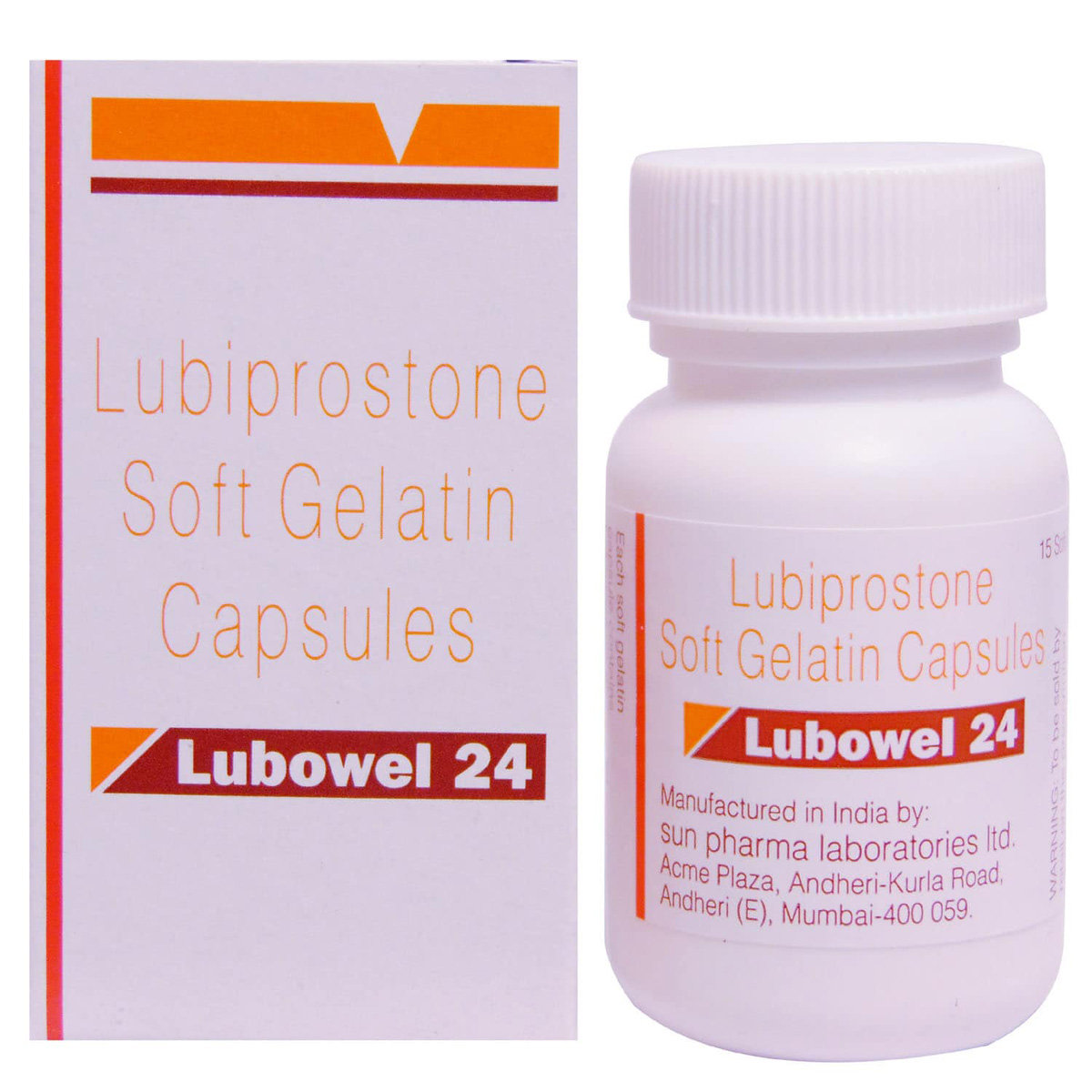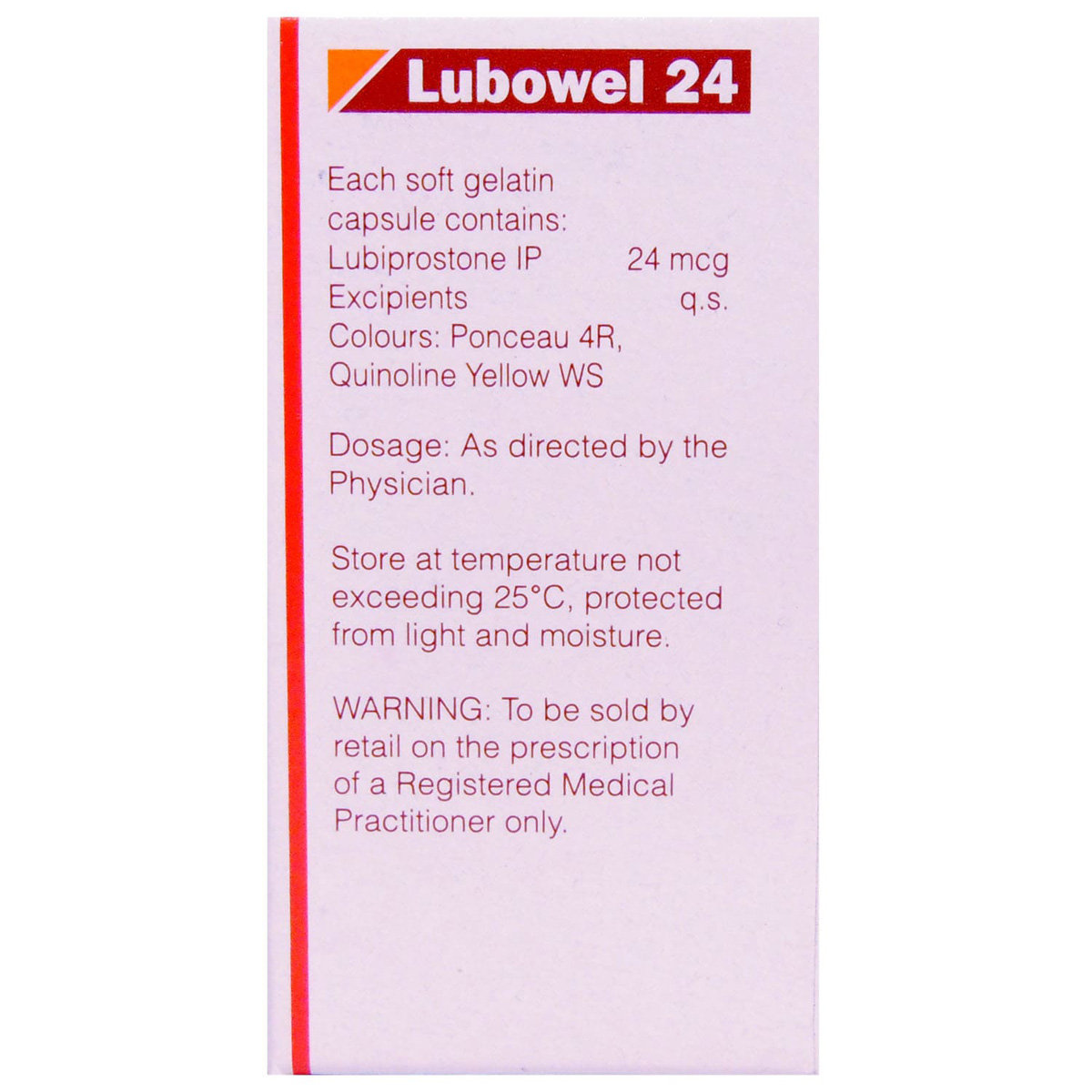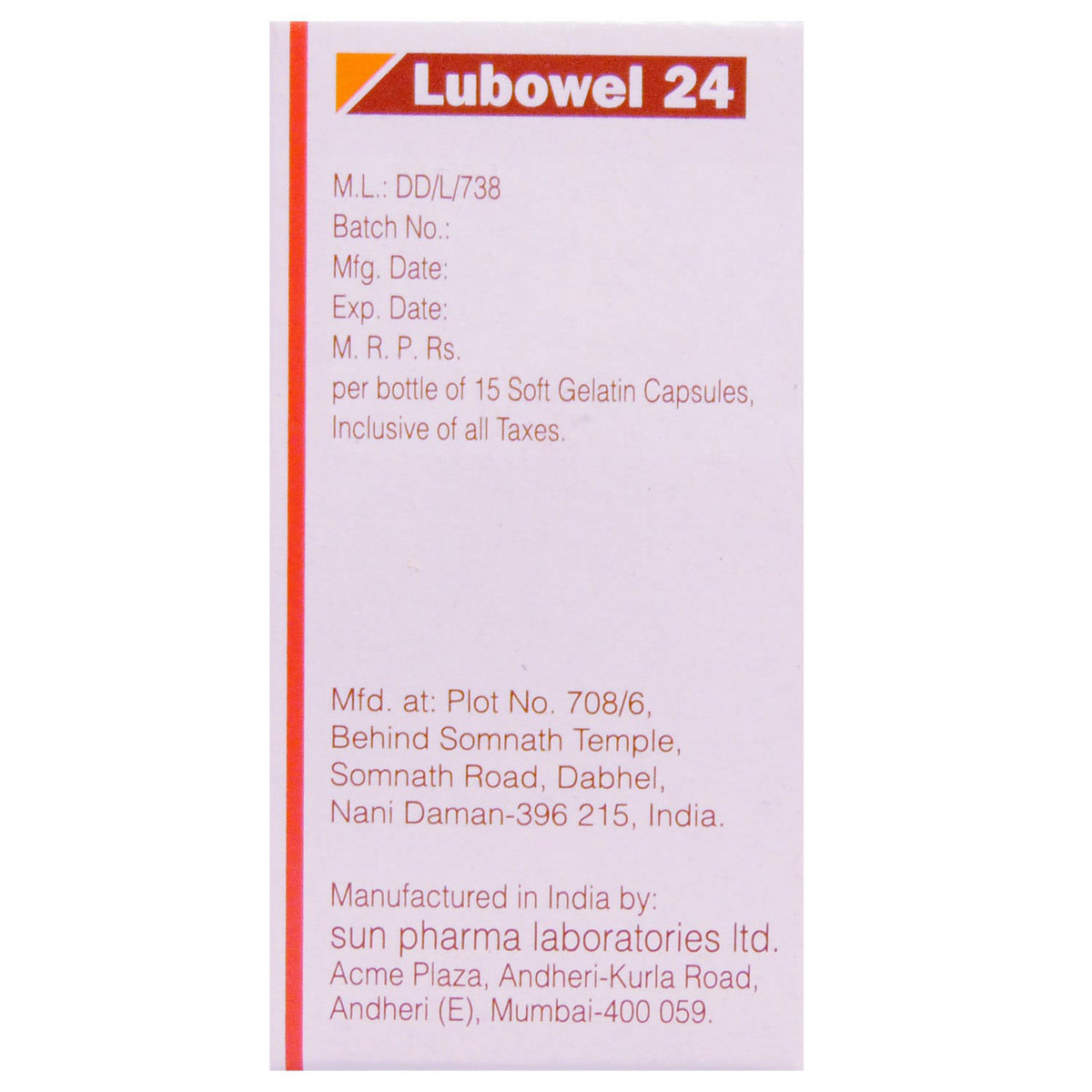Lubowel 24 Capsule 15's
MRP ₹426.5
(Inclusive of all Taxes)
₹64.0 Cashback (15%)
Provide Delivery Location
Online payment accepted
 Prescription drug
Prescription drugWhats That
Composition :
Manufacturer/Marketer :
Consume Type :
Expires on or after :
Return Policy :
About Lubowel 24 Capsule
Lubowel 24 Capsule belongs to the group of medicines called laxatives used to treat chronic constipation and constipation associated with medicines like opioids (painkillers). Besides this, Lubowel 24 Capsule is also used to treat irritable bowel syndrome-associated constipation in women. Constipation refers to infrequent bowel movements in which the stools are often dry, painful and hard to pass. A constipated person has fewer than three bowel movements in a week. It occurs when the large intestine's regular muscle contractions slow down, thereby causing incomplete bowel elimination from the body.
Lubowel 24 Capsule contains ‘Lubiprostone’ that works by retaining the water inside the intestines, which causes the intestine's easy movement. It also acts by drawing water into the bowel and makes the stool softer and easier to pass, thereby providing relief from constipation. Thus, it relieves constipation. Lubowel 24 Capsule also helps in normalizing bowel movements.
You are advised to take Lubowel 24 Capsule for as long as your doctor has prescribed it for you, depending on your medical condition. You may experience certain common side effects such as diarrhoea, abdominal discomfort, pain or cramps, nausea and headache in some cases. Most of these side effects do not require medical attention and will resolve gradually over time. However, you are advised to talk to your doctor if you experience these side effects persistently.
To treat your condition effectually, continue taking Lubowel 24 Capsule for as long as your doctor has prescribed. Lubowel 24 Capsule should not be given to the people who had an allergic reaction to Lubowel 24 Capsule or any of its components, signs of dehydration, problems like appendicitis, bowel blockage (intestinal obstruction) and liver disease. Consult your doctor before taking Lubowel 24 Capsule if you are pregnant or breastfeeding, your doctor will prescribe you Lubowel 24 Capsule only if the benefits outweigh the risks. Lubowel 24 Capsule is not recommended to children below 18 years. Drink plenty of fluids (at least 6-8 glasses) while taking Lubowel 24 Capsule to prevent dehydration.
Uses of Lubowel 24 Capsule
Directions for Use
Key Benefits
Lubowel 24 Capsule belongs to the group of medicines called laxatives used to treat long-lasting constipation in adults and constipation associated with opioid (painkillers) pain medicine, and irritable bowel syndrome associated with constipation. Lubowel 24 Capsule consists of ‘Lubiprostone’ that works by retaining the water inside the intestines, which causes the intestine's easy movement. It also acts by drawing water into the bowel and makes the stool softer and easier to pass, thereby providing relief from constipation. Lubowel 24 Capsule helps in normalizing bowel movements.
Storage
- Inform your doctor about the nausea and discuss possible alternatives to the medication or adjustments to the dosage.
- Divide your daily food intake into smaller, more frequent meals to reduce nausea.
- Opt for bland, easily digestible foods like crackers, toast, plain rice, bananas, and applesauce.
- Avoid certain foods that can trigger nausea, such as fatty, greasy, spicy, and smelly foods.
- Drink plenty of fluids, such as water, clear broth, or electrolyte-rich beverages like coconut water or sports drinks.
- Use ginger (tea, ale, or candies) to help relieve nausea.
- Get adequate rest and also avoid strenuous activities that can worsen nausea.
- Talk to your doctor about taking anti-nausea medication if your nausea is severe.
- Record when your nausea occurs, what triggers it, and what provides relief to help you identify patterns and manage your symptoms more effectively.
- Inform Your Doctor: Notify your doctor immediately about your diarrhoea symptoms. This allows them to adjust your medication or provide guidance on managing side effects.
- Stay Hydrated: Drink plenty of fluids to replace lost water and electrolytes. Choose water, clear broth, and electrolyte-rich drinks. Avoid carbonated or caffeinated beverages to effectively rehydrate your body.
- Follow a Bland Diet: Eat easy-to-digest foods to help firm up your stool and settle your stomach. Try incorporating bananas, rice, applesauce, toast, plain crackers, and boiled vegetables into your diet.
- Avoid Trigger Foods: Steer clear of foods that can worsen diarrhoea, such as spicy, fatty, or greasy foods, high-fibre foods, and dairy products (especially if you're lactose intolerant).
- Practice Good Hygiene: Maintain good hygiene to prevent the spread of infection. To stay healthy, wash your hands frequently, clean and disinfect surfaces regularly, and avoid exchanging personal belongings with others.
- Take Anti-Diarrheal Medications: If your doctor advises, anti-diarrheal medications such as loperamide might help manage diarrhoea symptoms. Always follow your doctor's directions.
- Keep track of your diarrhoea symptoms. If they don't get better or worse or are accompanied by severe stomach pain, blood, or dehydration signs (like extreme thirst or dark urine), seek medical help.
- Hydrate your body: Drink enough water to prevent dehydration and headaches.
- Calm Your Mind: Deep breathing and meditation can help you relax and relieve stress.
- Rest and Recharge: Sleep for 7-8 hours to reduce headache triggers.
- Take rest: lie down in a quiet, dark environment.
- Cold or warm compresses can help reduce tension.
- Stay Upright: Maintain good posture to keep symptoms from getting worse.
- To treat headaches naturally, try acupuncture or massage therapy.
- Over-the-counter pain relievers include acetaminophen and ibuprofen.
- Prescription Assistance: Speak with your doctor about more substantial drug alternatives.
- Severe Headaches: Seek emergency medical assistance for sudden, severe headaches.
- Frequent Headaches: If you get reoccurring headaches, consult your doctor.
- Headaches with Symptoms: Seek medical attention if your headaches include fever, disorientation, or weakness.
- Drink water or other clear fluids.
- To prevent worsening of pain, limit intake of tea, coffee, or alcohol.
- Include bland foods like rice, toast, crackers, and rice in your diet.
- Avoid lying down immediately after eating as it may cause indigestion or heartburn.
- Avoid acidic and spicy food as it may cause indigestion.
- Tell your doctor about your GAS symptoms. They may change your medication regimen or prescribe additional drugs to help you manage them.
- To manage GAS symptoms, eat a balanced diet of fibre, vegetables, and fruits.
- Drink enough water throughout the day to avoid constipation and treat GAS symptoms.
- Regular exercise like yoga and walking may help stimulate digestion and alleviate GAS symptoms.
- Take probiotics only if your doctor advises, as they may help alleviate GAS symptoms by promoting gut health.
- Take medication for GAS symptoms only if your doctor advises, as certain medications can interact with your existing prescriptions or worsen symptoms.
- If symptoms persist, worsen, or are accompanied by severe abdominal pain, vomiting, or bleeding, seek immediate medical attention.
- Inform your doctor about the nausea and discuss possible alternatives to the medication or adjustments to the dosage.
- Divide your daily food intake into smaller, more frequent meals to reduce nausea.
- Opt for bland, easily digestible foods like crackers, toast, plain rice, bananas, and applesauce.
- Avoid certain foods that can trigger nausea, such as fatty, greasy, spicy, and smelly foods.
- Drink plenty of fluids, such as water, clear broth, or electrolyte-rich beverages like coconut water or sports drinks.
- Use ginger (tea, ale, or candies) to help relieve nausea.
- Get adequate rest and also avoid strenuous activities that can worsen nausea.
- Talk to your doctor about taking anti-nausea medication if your nausea is severe.
- Record when your nausea occurs, what triggers it, and what provides relief to help you identify patterns and manage your symptoms more effectively.
- Inform Your Doctor: Notify your doctor immediately about your diarrhoea symptoms. This allows them to adjust your medication or provide guidance on managing side effects.
- Stay Hydrated: Drink plenty of fluids to replace lost water and electrolytes. Choose water, clear broth, and electrolyte-rich drinks. Avoid carbonated or caffeinated beverages to effectively rehydrate your body.
- Follow a Bland Diet: Eat easy-to-digest foods to help firm up your stool and settle your stomach. Try incorporating bananas, rice, applesauce, toast, plain crackers, and boiled vegetables into your diet.
- Avoid Trigger Foods: Steer clear of foods that can worsen diarrhoea, such as spicy, fatty, or greasy foods, high-fibre foods, and dairy products (especially if you're lactose intolerant).
- Practice Good Hygiene: Maintain good hygiene to prevent the spread of infection. To stay healthy, wash your hands frequently, clean and disinfect surfaces regularly, and avoid exchanging personal belongings with others.
- Take Anti-Diarrheal Medications: If your doctor advises, anti-diarrheal medications such as loperamide might help manage diarrhoea symptoms. Always follow your doctor's directions.
- Keep track of your diarrhoea symptoms. If they don't get better or worse or are accompanied by severe stomach pain, blood, or dehydration signs (like extreme thirst or dark urine), seek medical help.
Drug Warnings
Do not take Lubowel 24 Capsule if you are allergic to any of its contents. Consult your doctor before taking Lubowel 24 Capsule if you are pregnant or breastfeeding, your doctor will prescribe you Lubowel 24 Capsule only if the benefits outweigh the risks. Lubowel 24 Capsule should not be given to children as safety and effectiveness have not been established. Drink plenty of fluids (at least 6-8 glasses) to avoid dehydration while taking Lubowel 24 Capsule . Do not take Lubowel 24 Capsule if you have severe dehydration, appendicitis, blockage in the intestine, blocked bowel or inflammation of the bowel and liver disease. Do not take Lubowel 24 Capsule unless prescribed by your doctor. If you feel light-headed every time, you take this medicine, inform your doctor. You may have tightness in your chest or feel short of breath talk with your doctor if this side effect becomes bothersome. Keep your doctor informed about your health condition and medicines to rule out any side effects.
Drug-Drug Interactions
Drug-Drug Interactions
Login/Sign Up
Drug-Food Interactions
Drug-Food Interactions
Login/Sign Up
Diet & Lifestyle Advise
- Try maintaining a balanced diet that includes fresh fruits and vegetables.
- Stay hydrated, and drink enough water and fluids.
- Exercise regularly and stay fit.
- Get enough sleep.
- Try making time to empty your bowels whenever the body tells you to.
- Eat food rich in fibre, such as whole-wheat bread, oatmeal, flaxseed, nuts, beans, lentils, fruits (berries, apples, oranges, bananas, pears, figs) and vegetables (broccoli, spinach, sweet potatoes, avocados).
Side Effects of Lubowel 24 Capsule
- Abdominal pain
- Diarrhea
- Headache
- Flatulence
- Nausea
- Vomiting
- Dry mouth
- Trouble sleeping
Habit Forming
Therapeutic Class
All Substitutes & Brand Comparisons
Author Details
We provide you with authentic, trustworthy and relevant information
Drug-Diseases Interactions
Drug-Diseases Interactions
Login/Sign Up
FAQs
Lubowel 24 Capsule consists of 'Lubiprostone' that works by increasing the secretion of fluids in the intestine, which in turn increases the motility of the intestine, thereby making the stool soft and easier to pass.
Consult your doctor before taking Lubowel 24 Capsule with other medicines as Lubowel 24 Capsule may increase the rate of gastrointestinal transit, and this may affect the absorption of other orally administered medicines given simultaneously.
Diarrhea might be a side-effect of Lubowel 24 Capsule . Drink lots of fluids and eat fibre-rich food if you experience diarrhea. If you find blood in your stools (tarry stools) or if you experience excess diarrhea, consult your doctor. Do not take anti-diarrheal medicine on your own.
Constipation happens when the normal actions of muscle in the large intestine get slowed down, which means the waste products (stools) do not easily eliminated from the body.
Overuse or prolonged use of Lubowel 24 Capsule may cause dehydration. Severe dehydration may cause weakness, tremors, fainting and blurry vision. Consult your doctor immediately if you experience these symptoms. Drink enough fluids to avoid dehydration.
Drug-Drug Interactions Checker List
- METHADONE
- IDELALISIB
Special Advise
- Include more fiber in your diet to avoid constipation, and most importantly never ignore the urge to have a bowel movement.
Disease/Condition Glossary
Constipation: It refers to infrequent bowel movements in which stools are often dry, painful and hard to pass. Constipation is a condition in which the person has fewer than three bowel movements in a week. However, bowel patterns may vary from person to person. Symptoms include bloating, abdominal pain and feeling as if the bowel movement is incomplete. Constipation occurs when the large intestine's normal muscle contractions slow down, which causes the incomplete elimination of the bowel from the body. Constipation could be associated with a sudden change of diet, a diet with less fibre, not drinking enough liquids and lack of exercise.

Have a query?
Alcohol
Safe if prescribed
It is not known if alcohol interacts with Lubowel 24 Capsule . Please consult your doctor if you have any concerns regarding this.
Pregnancy
Consult your doctor
Lubowel 24 Capsule is a pregnancy category C drug. If you are pregnant, please consult your doctor before taking Lubowel 24 Capsule ; your doctor will prescribe Lubowel 24 Capsule if the benefits outweigh the risks.
Breast Feeding
Consult your doctor
Your baby may develop diarrhea if you take Lubowel 24 Capsule while breastfeeding. Please consult your doctor before taking Lubowel 24 Capsule if you are breastfeeding, your doctor will prescribe Lubowel 24 Capsule if the benefits outweigh the risks.
Driving
Safe if prescribed
Lubowel 24 Capsule has negligible influence on your ability to drive.
Liver
Consult your doctor
Take Lubowel 24 Capsule with caution, especially if you have a pre-existing or a history of liver disease. The dose may be adjusted by your doctor as required. However, Lubowel 24 Capsule is not recommended in patients with severe liver disease.
Kidney
Consult your doctor
Dose adjustment may be needed in patients with severe kidney impairment. Please consult your doctor if you have kidney problems or any concerns.
Children
Safe if prescribed
Lubowel 24 Capsule should not be given to children as safety and effectiveness have not been established.










